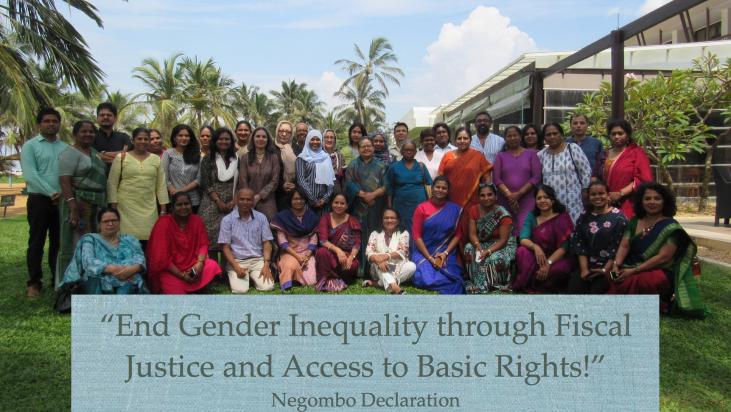The Negombo Declaration has been presented on 20 November 2018, to “End gender inequality through Fiscal Justice and Access to Basic Rights!“.
The Declaration was the conclusion of the South Asian Women’s Convergence, held in Negombo, Sri Lanka, on 18-20 November 2018.
The South Asia Alliance for Poverty Eradiction (SAAPE), a member of the regional chapter of the Global Alliance for Tax Justice, Tax and Fiscal Justice Asia (TAFJA), participated in organising the South Asian Women’s Convergence on Addressing Gender Inequality through Fiscal Justice And Access to Basic Rights. It was organised by the Sri Lankan organisations Community Education Centre, Eastern United Women’s Organisation, Human Development Organisation, Janawaboda Kedraya, Law and Society Trust, Mothers and Daughters of Lanka, Women’s Political Academy and OXFAM. Participants expressed their concern about the staggering level of inequalities affecting millions of women in South Asia.
The Convergence attempted to understand ‘inequality’ as an overall development challenge in South Asia. Similarly, the gender dimension of economic inequality and access to basic services and their link to the fiscal policies were discussed and analysed.
The Negombo Declaration is the result of a South Asian process: more than 40 participants from Afghanistan, Bangladesh, India, Maldives, Nepal, Pakistan and Sri Lanka contributed, representing women’s organisations, political activists, mass organisations and networks, social movements and academia and also members of parliament.
The participants developed a short and long-term regional campaign plan to raise the question of gender inequality with a focus on fiscal policies.
The Convergence was concluded with the Negombo Declaration, that gathers demands and measures in order to fight these inequalities, and create a fair and equal society:
- Concentration of wealth: states should take immediate measures to reduce the rising inequality resulting from the concentration of wealth in the hands of a few, the financial elite.
- Direct taxes: South Asian governments should increase the tax to GDP (Gross Domestic Product) ratio. This would allow to mobilise tax revenue through progressive direct taxes, and also reduce the burden of indirect taxes.
- Race to the bottom: tax incentives, tax exemptions, and tax holidays are unfair and unproductive: under the pretext of attracting investments, they actually drain public tax revenue. The Negombo Declaration asks to end these exemptions, and for collaboration between South Asian states that will help ending this race to the bottom.
- Public expenditure: public spending on priority social sectors must be increased, especially in education, health and social protection. Inequalities from which women suffer more must be addressed. Other spending must be reduced, such as military and other unproductive expenditure.
- Gender pay gap: states should take pro-active initiatives to ensure living wages for every trade and occupation, and end the gender pay gap.
- Unpaid care work: South Asian governments should recognise, reduce and redistribute women’s unpaid care work. Valuation, technological innovations and investment can help free women of such oppression.
- Gender budgeting: in order to do so, the Negombo Declaration demands governments expedite process of gender budgeting and engage women’s group to work on the gender budgeting and taking care of gender dimensions.
- Investment: South Asian states should invest in promoting women-led business and enterprises.
- Representation: women should be equally represented in all decision making bodies. In particular in all fiscal policy-making process, implementation and monitoring.
The Negombo Declaration also committed to take the following steps to pursue and achieve the goals expressed above:
- Collaborate in campaigning across the region to create awareness around Gender Inequality.
- Train and mobilise people around these demands and create visible actions across the region.
- Create a united front among South Asians to make their voices heard asking for gender inequality to come to an end.
- Public mobilisations during the World Economic Forum in Davos, Switzerland, (8-25 January, 2019) will be held in Nepal, Bangladesh, Pakistan, India, Sri Lanka and Afghanista, as a part of a worldwide movement against inequality. Demonstrations, rallies, art work, musical performance and cartoons are some of the mobilisations that will take place.
You can follow South Asia Alliance for Poverty Eradication’s Facebook page:
